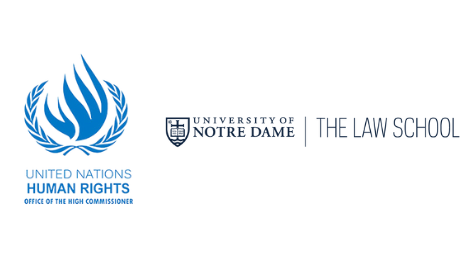4th International Conference on Small Island Developing States Side Event

“Realizing the Rights to Development and to a Clean Healthy and Sustainable Environment in Global and Local Climate Actions Affecting Small Island Developing States.”
Click here to register to attend the 4th International Conference on SIDS Side Event
The Side Event is co-organized by the UN Office of the High Commissioner for Human Rights and the Notre Dame Law School Global Human Rights Clinic. Out of 300 applications around the world, The Notre Dame Law School GHRC was selected to present its research on small island developing states, climate change, and human rights at the 4th United Nations Conference on Small Island Developing States on May 27, 2024, at 9 am EST.
Learn more about the 4th International Conference on Small Island Developing States (SIDS).
Moderator:
Mr. Jean Marc Brissau
Staff Attorney, NDLS Global Human Rights Clinic; Graduate Programs Manager and Term-Teaching Professor, Notre Dame Law School LLM Program in International Human Rights Law
Presentation of Desk Study Research and Data Set:
Ms. Diane A. Desierto
Professor of Law and Global Affairs, Faculty Director of the LLM Program in International Human Rights Law, and Founding Director of the NDLS Global Human Rights Clinic, Notre Dame Law School; jointly appointed as tenured full Professor at the Keough School of Global Affairs, University of Notre Dame (Notre Dame, USA). Faculty Fellow (Klau Institute on Civil and Human Rights, Kellogg Institute on International Studies, Liu Institute on Asia and Asian Studies, Pulte Institute on Global Development, Nanovic Institute of European Studies), and Co-Principal Investigator, Notre Dame Reparations Design and Compliance Lab
Discussants:
Ms. Heike Alefsen
Regional Representative, OHCHR Regional Office for the Pacific
Ms. Shyami Puvimanasinghe
Human Rights Officer, Right to Development Section, OHCHR Geneva
Ms. Emeline Siale Ilolahia
Executive Director, Pacific Islands Association of Non Governmental Organisations (PIANGO)
Representative of the Alliance of Small Island States (AOSIS) (TBC)[SP1] [SP2]
Mr. Walton Alfonso Webson
Ambassador Extraordinary and Plenipotentiary,
Permanent Representative of Antigua and Barbuda to the United Nations (TBC)
Ms. Thalia Viveros Uehara
Senior Research Fellow, Max Planck Institute for
Comparative Public Law and International Law (Heidelberg, Germany) (TBC)
Ms. Marie-Claire Cordonier Segger
Chair, Sustainable Development Law and Policy, and Director of Studies and Programme Director, Lucy Cavendish College, University of Cambridge; Senior Director, Centre for International Sustainable Development Law; Executive Secretary, Climate Law and Governance Initiative for the UN Framework Convention on Climate Change, and Chair, UN Convention on Biological Diversity - Biodiversity Law and Governance Initiative
Read the Notre Dame Law School GHRC's Concept Proposal here
Small Island Developing States (SIDS)
Small Island Developing States (SIDS) comprise 37 UN member nations and 20 associate members of regional commissions, uniquely and unfortunately positioned at the forefront of multiple global crises, notably climate change. These remote economies, prone to natural disasters were formally recognized as a special case both for their environment and development at the 1992 United Nations Conference on Environment and Development held in Rio de Janeiro, Brazil. Occupying less than 0.5 per cent of the world's surface, these nations are spread across three key regions: the Caribbean, the Pacific and the Atlantic, Indian Ocean and South China Sea (AIS).
In the face of escalating global crises, including climate change and COVID-19, SIDS find themselves on the frontline, constantly navigating through a cycle of environmental disasters and recovery efforts, which tests their resilience and ability to sustain their communities and economies.
Challenges and characteristics
SIDS grapple with high import and export costs, heavy reliance on external markets and limited natural resources. Tourism, a vital sector constituting about 30 per cent of their GDP, was significantly impacted by the COVID-19 pandemic.
The extensive marine areas surrounding SIDS serve as vital resources but also increase their vulnerability. With a population density that is significantly higher than the global average — SIDS are acutely susceptible to the catastrophic effects of natural disasters, which can incur annual damage costs ranging from one to eight per cent of their GDP. This situation is further exacerbated by fiscal challenges such as high debt, costly debt servicing and limited access to concessional financing due to their middle-income status. Compounded by factors such as limited population size, isolation from international markets, elevated transportation costs and exposure to external economic shocks, these states face heightened risks to their fragile land and marine ecosystems, making them particularly prone to biodiversity loss and the impacts of climate change.
Contributing less than one per cent of global greenhouse gas emissions, SIDS disproportionately suffer from climate change impacts. Around 75 per cent of their coral reefs are threatened by climate change. The cost for environmental adaptation is estimated between USD 22 billion and USD 26 billion yearly, underscoring the need for urgent global cooperation and support.
The United Nations supports SIDS through UN entities within country and regional level presence, including through the UN Resident Coordinator Offices. The Regional Commissions also support the sustainable development of SIDS at the regional level. The Department of Economic and Social Affairs and the Office of the High Representative for the Least Developed Countries, Landlocked Developing Countries and Small Island Developing States support SIDS at the global level. Additionally, the Caribbean and the Pacific SIDS are also supported through their own intergovernmental organizations and agencies at the regional and sub-regional level, e.g. by the Caribbean Community (CARICOM), and by the Council of Regional Organizations of the Pacific (CROP) Agencies. The countries in the AIS regional have been at certain intervals supported by the Indian Ocean Commission (IOC) and by the Economic Commission for Africa (ECA).